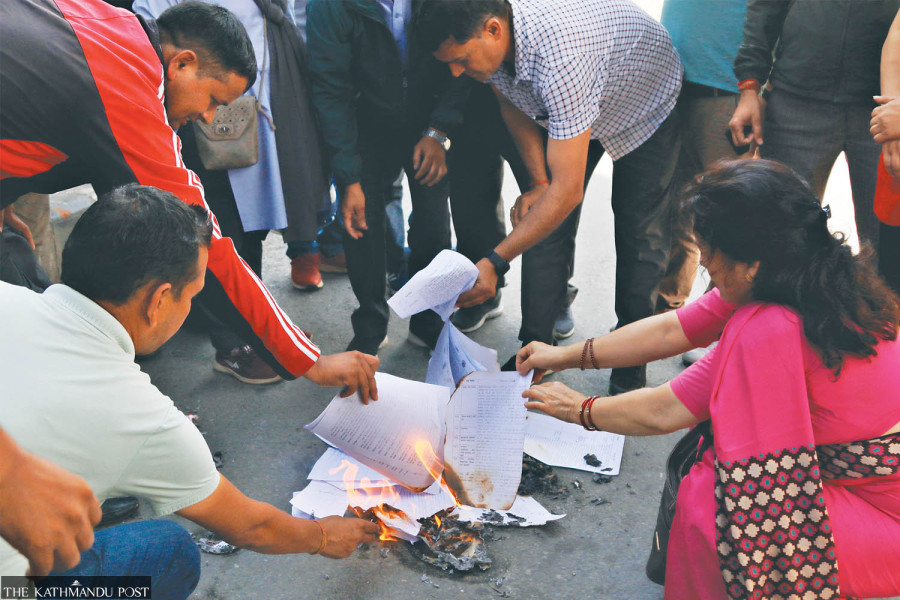Columns
Emboldened anti-private sector narrative
This is mainly the work of influential political parties, particularly the Marxist variety.
Achyut Wagle
Deliberations on the principles of the Bill Designed to Amend and Integrate the Education-related Laws concluded in the House of Representatives last week. Over 90 parliamentarians participated in them. One focal point of the discussions was making high school education entirely free in accordance with the constitutional provision. It is a benign expectation if the state can afford, sustain and deliver it. But that doesn't seem to be the case.
Government-funded public education is now literally in a shambles. The quality gap in school education is being filled by the private sector, which accounts for nearly 2.5 million students, or about 30 percent of all students, in some 10,000 institutional schools set up with an estimated combined investment of Rs600 billion. But this contribution of the private sector in terms of investment, job creation and relatively better quality of education was dismissed even in the parliamentary discussions, let alone duly recognised. The tone of the debates inside the nation's highest lawmaking body was essentially scornful of private sector investment–in education or elsewhere.
Something to cherish
Such a highly skewed debate exemplifies how “mainstream” political discourse emboldens anti-private sector narratives. This is despite the private sector’s contribution to all major sectors of the economy, including public services, which is generally a success story and something to cherish.
Nepal enjoys one of the cheapest public transport systems in the world. The transport sector alone contributes over 10 percent to the gross domestic product (GDP). The banking industry is heavily private sector-dominated, exemplified by how three public sector banks account for only Rs620 billion, or 11 percent, out of the Rs5,840 billion in customer deposits. This is one of the sectors considered to be resilient and well-regulated and contributes about 7 percent to GDP.
The latest encouraging development is in hydropower, in terms of private investment and growing output. Nepal's electricity production is poised to reach 2,800 megawatts, and the private sector is responsible for half of that. There are several projects under construction, including a big one with foreign direct investment.
Other industries, including healthcare, have similar stories. Out of the estimated 10,000 hospital beds in the country, about 60 percent belong to private service providers. More than 70 percent of healthcare professionals, including 60 percent of practising physicians, are produced by private medical and nursing colleges while the government, more often than not, has been a barrier instead of a facilitator.
The government has done precious little to promote industry and investment in information technology and digital economy. Whatever the country has achieved in these sectors has been possible only due to private sector initiatives. Even the work of bringing workers' remittances from abroad through formal channels was initiated by the private sector. Remittance inflow by now has become the most indispensable lifeline for the Nepali economy.
As revealed by a recent report, Nepal's private sector contributes 81 percent to the national GDP and employs nearly 87 percent of the workforce. Despite these impressive figures, the private sector is treated as an unwanted extractive element and source of all economic malaises.
The anti-private sector narratives are mainly set by influential political parties, particularly those with a Marxist orientation. The social value system that sees profit as lucre might also be an additional contributing factor to the low level of innovation and entrepreneurship. The costly ramifications of depriving the private sector of a level playing field when public players are in the market and subjecting it to an over-regulating mindset manifest in dwindling investment, ever-increasing capital flight and shrinking manufacturing base.
Who is to blame?
Nepal's constitution provides ample room for those who want to advocate for a state-control economy by “being committed to socialism”, aiming “to attain a sustainable economic development…through participation and development of public, private and cooperatives; and to develop a socialism-oriented independent and prosperous economy”, among others.
At the functional level, cooperatives, which must be treated as a segment of the private sector, are allowed to openly flout the globally established seven principles of cooperatives and operate as loan sharks. Microfinance institutions that claim to have a 6 million-strong consumer base also exhibit exploitative tendencies like cooperatives. The pervasiveness of irregularities in these sectors that are out of regulatory radar is responsible for defaming private sector-promoted industries like banking and small and medium enterprises.
The Bretton Woods-like institutions, which portray themselves as the global messiah of private property rights and can play a critical role in ending this, act just the opposite in a country like Nepal. They hire mostly former bureaucrats as consultants to prepare their country reports and to provide policy inputs to the government in important areas of economic and social reform. These bureaucrats, who have apparently been burnt out while in government service, have a pro-control and anti-free market mindset of always penalising the private sector. This mindset gets diffused to political decision-making as well.
Finally, Nepal is increasingly becoming a classic case where politics ceases to represent neither the life the citizens live today nor the life they wish to lead. It is the main source of the anti-private sector narratives structured by our ruling political elite. If the future of investment is insecure under politicians who thrive on ant-private sector populism and the state that lacks policy predictability, it is little wonder that the entrepreneurial ecosystem is in reverse gear. That is exactly where Nepal stands today.




 10.12°C Kathmandu
10.12°C Kathmandu















